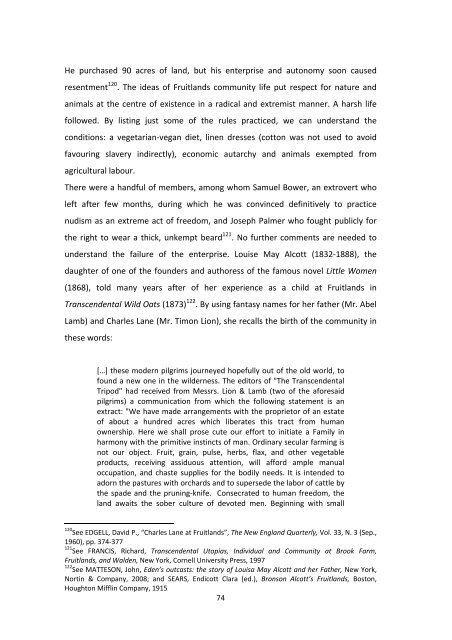building the american landscape - Univerza v Novi Gorici
building the american landscape - Univerza v Novi Gorici
building the american landscape - Univerza v Novi Gorici
Create successful ePaper yourself
Turn your PDF publications into a flip-book with our unique Google optimized e-Paper software.
He purchased 90 acres of land, but his enterprise and autonomy soon caused<br />
resentment 120 . The ideas of Fruitlands community life put respect for nature and<br />
animals at <strong>the</strong> centre of existence in a radical and extremist manner. A harsh life<br />
followed. By listing just some of <strong>the</strong> rules practiced, we can understand <strong>the</strong><br />
conditions: a vegetarian‐vegan diet, linen dresses (cotton was not used to avoid<br />
favouring slavery indirectly), economic autarchy and animals exempted from<br />
agricultural labour.<br />
There were a handful of members, among whom Samuel Bower, an extrovert who<br />
left after few months, during which he was convinced definitively to practice<br />
nudism as an extreme act of freedom, and Joseph Palmer who fought publicly for<br />
<strong>the</strong> right to wear a thick, unkempt beard 121 . No fur<strong>the</strong>r comments are needed to<br />
understand <strong>the</strong> failure of <strong>the</strong> enterprise. Louise May Alcott (1832‐1888), <strong>the</strong><br />
daughter of one of <strong>the</strong> founders and authoress of <strong>the</strong> famous novel Little Women<br />
(1868), told many years after of her experience as a child at Fruitlands in<br />
Transcendental Wild Oats (1873) 122 . By using fantasy names for her fa<strong>the</strong>r (Mr. Abel<br />
Lamb) and Charles Lane (Mr. Timon Lion), she recalls <strong>the</strong> birth of <strong>the</strong> community in<br />
<strong>the</strong>se words:<br />
[…] <strong>the</strong>se modern pilgrims journeyed hopefully out of <strong>the</strong> old world, to<br />
found a new one in <strong>the</strong> wilderness. The editors of "The Transcendental<br />
Tripod" had received from Messrs. Lion & Lamb (two of <strong>the</strong> aforesaid<br />
pilgrims) a communication from which <strong>the</strong> following statement is an<br />
extract: "We have made arrangements with <strong>the</strong> proprietor of an estate<br />
of about a hundred acres which liberates this tract from human<br />
ownership. Here we shall prose cute our effort to initiate a Family in<br />
harmony with <strong>the</strong> primitive instincts of man. Ordinary secular farming is<br />
not our object. Fruit, grain, pulse, herbs, flax, and o<strong>the</strong>r vegetable<br />
products, receiving assiduous attention, will afford ample manual<br />
occupation, and chaste supplies for <strong>the</strong> bodily needs. It is intended to<br />
adorn <strong>the</strong> pastures with orchards and to supersede <strong>the</strong> labor of cattle by<br />
<strong>the</strong> spade and <strong>the</strong> pruning‐knife. Consecrated to human freedom, <strong>the</strong><br />
land awaits <strong>the</strong> sober culture of devoted men. Beginning with small<br />
120 See EDGELL, David P., “Charles Lane at Fruitlands”, The New England Quarterly, Vol. 33, N. 3 (Sep.,<br />
1960), pp. 374‐377<br />
121 See FRANCIS, Richard, Transcendental Utopias, Individual and Community at Brook Farm,<br />
Fruitlands, and Walden, New York, Cornell University Press, 1997<br />
122 See MATTESON, John, Eden’s outcasts: <strong>the</strong> story of Louisa May Alcott and her Fa<strong>the</strong>r, New York,<br />
Nortin & Company, 2008; and SEARS, Endicott Clara (ed.), Bronson Alcott’s Fruitlands, Boston,<br />
Houghton Mifflin Company, 1915<br />
74
















